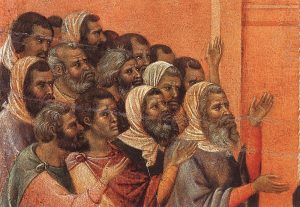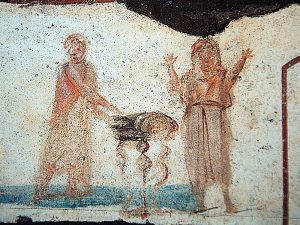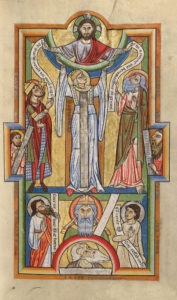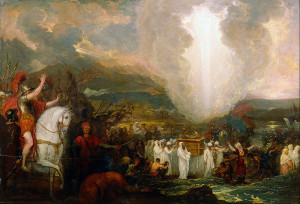Thoughts on Sunday’s Lessons for Aug. 18, 2024 (Pentecost 13B/Proper 15)

Christ Accused by the Pharisees (1308-1311), tempera painting on wood by Duccio di Buoninsegna (1255-1319). Museo dell’Opera Metropolitana del Duomo, Siena, Italy. (Click image to enlarge.)
First Reading (Track One): 1 Kings 2:10-12; 3:3-14
David died after 40 years as king, we hear in Sunday’s Track One first reading, and his son Solomon ascended to the throne. Solomon, the first surviving son of David and Bathsheba, would go on to a majestic reign. Here at the beginning of his reign, though, Solomon knows well that he is young and inexperienced. When God comes to Solomon in a dream and invites him to ask for whatever he might wish, Solomon chooses wisely: He asks not for long life or riches but for the wisdom to govern well. This pleases God, who rewards Solomon with wisdom and honor, asking only that the young king walk in God’s way. All will go well for many years, but Solomon’s reign, sadly, will come to a bad end when the lure of great power corrupts him.
First Reading (Track Two): Proverbs 9:1-6
What is wisdom? What is foolishness? How do we gain the one and learn from the other? Sunday’s Lectionary readings offer insight. Wisdom is often personified in the Hebrew Bible as a truth-speaking woman of valor, who was present with God at the Creation. In this short passage from Proverbs, traditionally said to have been written by Solomon himself, we see Wisdom setting the table for a great feast, to which she invites the simple – those who lack wisdom – to come and be made wise. Through wisdom one gains insight and becomes mature, learning to walk in God’s way.
Psalm (Track One): Psalm 111
This is one of the many Psalms that sing God’s praise with joy and exultation. Its verses shout thanksgiving for all of God’s work, all of God’s majesty and splendor, all of God’s justice that lasts forever. God feeds us, the Psalmist declares. God’s covenant redeems us, and the people shout “Hallelujah!” “Praise God!” And at the end, the reward is wisdom: “The fear of the Lord is the beginning of wisdom,” exults the final verse. “Those who act accordingly have a good understanding.”
Psalm (Track Two): Psalm 34:9-14
A bright young man came up with a puzzled look one morning after hearing this passage from Psalm 34. “I don’t understand about ‘fearing’ the Lord,” he said. “Are we supposed to be afraid of God?” We were quick to reassure him: Rather than being afraid, think instead of feeling awe, being awestruck by God’s love. As the Psalmist sings, follow in God’s way. Speak kindly and with truth; avoid evil and do good; work for peace.
Second Reading: Ephesians 5:15-20
This short passage from the letter to the Ephesians directs the hearer to pursue wisdom, not foolishness, and to fear God not in fright and alarm but with the awe that inspires love. It illustrates that point with specific advice of the kind that prompts many to view Paul as a moralistic finger-wagger: It urges the faithful to avoid drunken debauchery, turning to worship and hymns instead. (To be fair to Paul, though, this letter was almost certainly not written by Paul but by more rigid early Christians a generation or two later.) The passages that follow this reading offer more moral codes that have caused real problems in zealous modern interpretation: “Wives, be subject to your husbands as you are to the Lord,” and possibly even more problematic, “Slaves, obey your earthly masters with fear and trembling, in singleness of heart, as you obey Christ.”
Gospel: John 6:51-58
Jesus’ long narrative about the bread of life has taken a turn. Now a new crowd of Pharisees and temple leaders confronts Jesus and pushes back when he declares that everyone must “eat his flesh and drink his blood” to gain eternal life. Jesus doubles down in Mark’s telling, which uses a Greek word for “eat” that literally means “to gnaw,” “to crunch,” or “to chew.” When John’s Gospel was written after the destruction of the Temple, early Christianity and Rabbinic Judaism were angrily tearing apart. In John’s frequent use of “The Jews” as a dismissive term for the temple authorities who opposed Jesus, we hear a sad refrain that fostered centuries of anti-Judaism.



